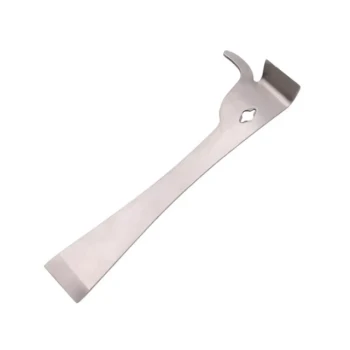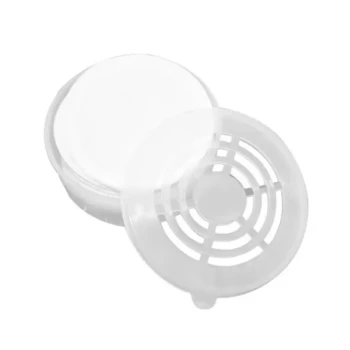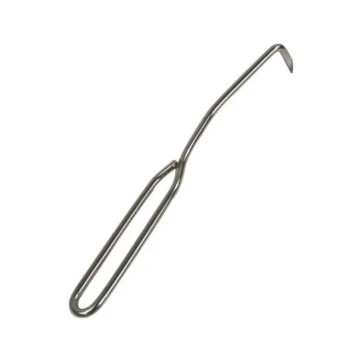The most significant damage from a high number of small hive beetle larvae is not caused by the larvae eating bees, but by the widespread contamination of the hive's food stores. The larvae crawl through the honeycomb, leaving behind a trail of slime that ferments the honey, making it inedible and ultimately forcing the bees to abandon their home.
The critical threat is not the larvae themselves, but the trail of slime they leave behind. This slime contaminates honey, causing it to ferment and rendering the entire hive environment uninhabitable, which ultimately forces the bee colony to abandon it.
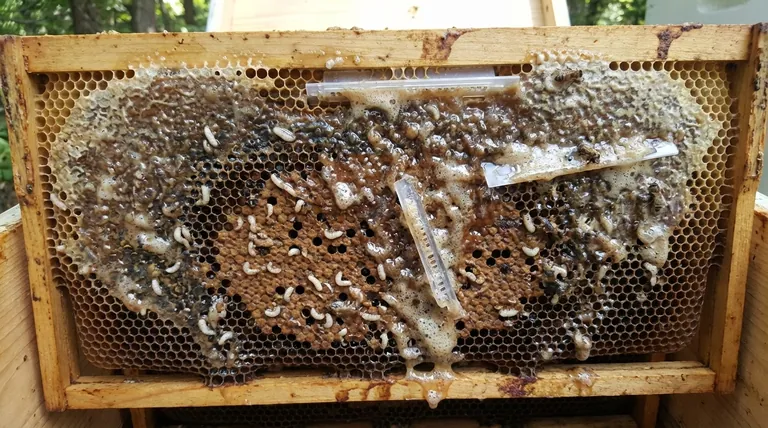
The Mechanism of Colony Destruction
When beetle larvae populations explode, they initiate a cascading failure within the hive. A healthy, strong colony can typically manage a small number of beetles and their larvae, but once a tipping point is reached, the process becomes irreversible.
The Tipping Point: When Bees Lose Control
A strong bee colony has "guard" bees that can trap and contain adult beetles and remove their larvae. A colony becomes vulnerable when its population is weakened or when the beetle infestation is so overwhelming that the bees can no longer keep up with removing the larvae.
The Primary Weapon: Larval Slime
The true damage comes from a substance the larvae excrete as they move. They tunnel through comb, consuming honey and pollen, and leave behind a trail of this destructive slime.
The Consequence: Fermentation and Spoilage
This slime contains yeasts that cause the honey to ferment rapidly. The honey becomes a frothy, foul-smelling mess, completely ruined as a food source for the bees. This contamination can spread quickly throughout the hive.
The Final Blow: The Hive Becomes Uninhabitable
The combination of fermented honey, the smell, and the sheer number of crawling larvae creates an environment the bees cannot tolerate. Faced with a contaminated and destroyed home, the remaining bees will often abscond, abandoning the hive entirely.
Why Adult Beetles Aren't the Main Culprit
It is crucial to distinguish between the threat levels of adult beetles and their larvae. This understanding is key to recognizing the true nature of an infestation.
Adults are a Nuisance, Larvae are a Catastrophe
Adult beetles are primarily a stressor. They eat honey, pollen, and bee eggs, but a strong colony can often manage their numbers. The bees will corral them into "jails" within the hive, limiting their movement.
The Real Damage is Exponential
The true danger of the adult beetles is their ability to lay thousands of eggs. Once these eggs hatch and the larval population explodes, the damage escalates from a manageable nuisance to a full-blown crisis that can destroy a colony in a matter of days.
Understanding the Point of No Return
Recognizing the signs of a severe larval infestation is critical for any beekeeper. The goal is to act before the colony reaches this catastrophic stage.
- If your primary goal is to assess hive health: The presence of larvae, not just adult beetles, is the key indicator of a serious problem.
- If your primary goal is to understand the collapse: Focus on the fermented honey and the slime trails as the direct cause that forces the bees to leave.
Ultimately, the destructive power of beetle larvae lies in their ability to poison the very environment the bees depend on for survival.
Summary Table:
| Stage of Infestation | Primary Threat | Consequence for the Colony |
|---|---|---|
| Low Larvae Population | Adult beetles as a stressor. | Strong colony can manage and contain. |
| High Larvae Population (Tipping Point) | Larval slime contaminating honeycomb. | Honey ferments, hive becomes uninhabitable. |
| Point of No Return | Widespread spoilage and foul odor. | Bee colony abandons the hive (absconds). |
Protect your apiary from catastrophic small hive beetle damage. A weakened colony is a vulnerable colony. HONESTBEE supplies commercial apiaries and beekeeping equipment distributors with the robust, high-quality supplies needed to maintain strong, healthy hives capable of defending against pests. Don't let larval slime destroy your investment. Contact our experts today to discuss wholesale solutions for protecting your bee colonies.
Visual Guide
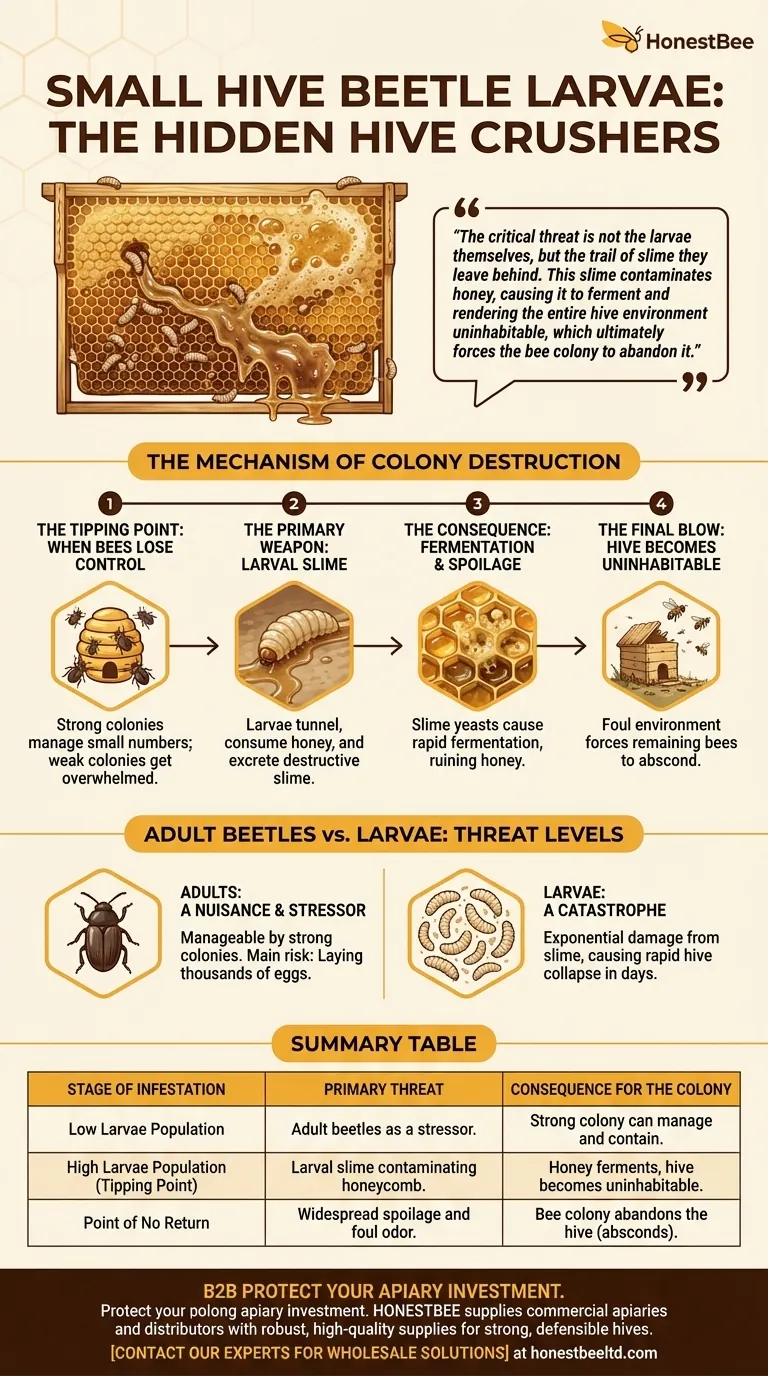
Related Products
- Removable Washable Hive Beetle Trap Attractants for Small Hive Beetles
- Wholesales Dadant Size Wooden Bee Hives for Beekeeping
- Professional Multi-Function Stainless Steel Hive Tool
- Plastic Beetle Blaster Trap Beekeeping Tools and Supplies
- Professional Insulated Plastic Bee Hives
People Also Ask
- Why is it necessary for beekeepers to use a reliable hive beetle trap? Secure Your Apiary's Health and Honey Yield
- How do hive beetle traps function in colony management? Effective Pest Control for Healthier Apiaries
- Can the material placed under a beehive help control Small Hive Beetles? Effective Ground Strategies for Apiaries
- What role do internal beetle traps play in monitoring hive infestations? Precise Diagnostics for Apiary Health
- What are the pros and cons associated with different types of hive beetle traps? Choose the Right Protection


